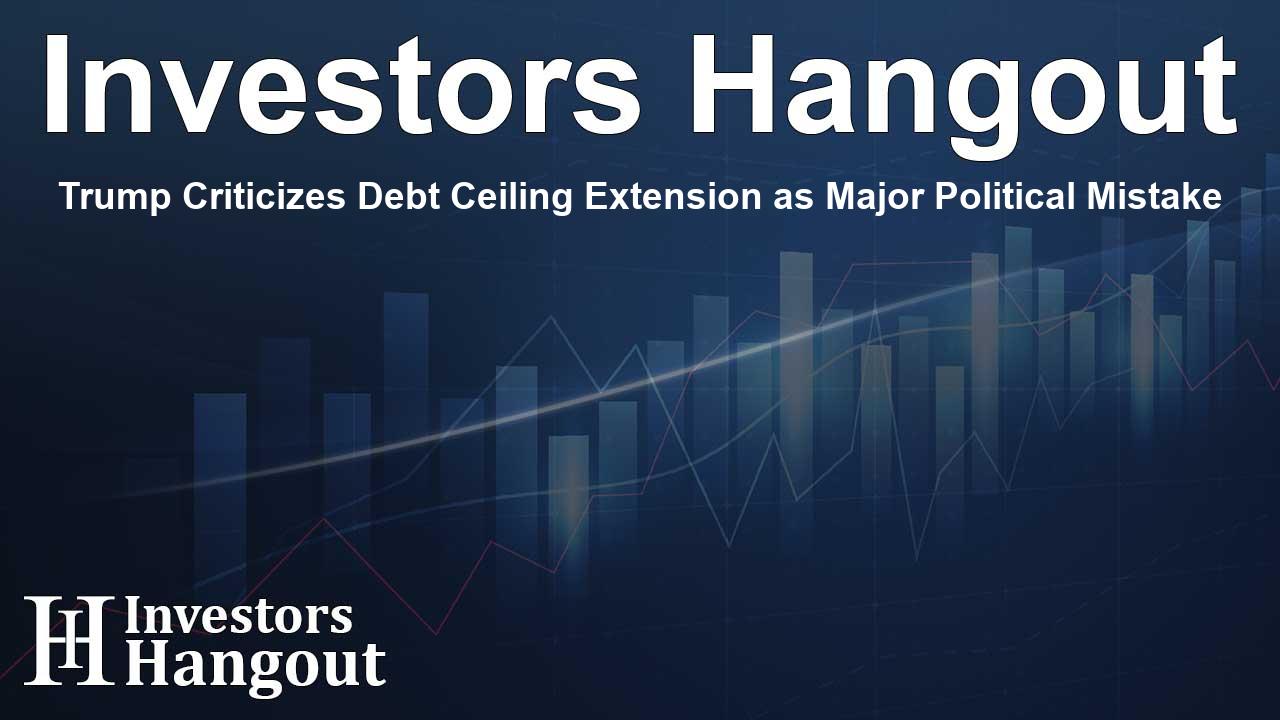Trump Criticizes Debt Ceiling Extension as Major Political Mistake

Trump's Strong Opposition to Debt Ceiling Extension
In a recent statement, U.S. President-elect Donald Trump criticized the extension of the debt ceiling, labeling it as a severe political blunder. This remark came in reference to a budget agreement made in 2023 involving then-House Speaker Kevin McCarthy and President Joe Biden.
The Debt Ceiling Deal Explained
According to the 2023 budget deal, Congress agreed to suspend the debt ceiling until January 1, 2025. This suspension allows the U.S. Treasury additional time to manage its financial obligations. However, Congress will ultimately need to revisit this matter within a year.
Trump's Remarks on the Agreement
Trump expressed his discontent over the decision through a post on Truth Social, where he stated, "The extension of the Debt Ceiling by a previous Speaker of the House, a good man and a friend of mine, will go down as one of the dumbest political decisions made in years." His comments highlight frustrations over fiscal irresponsibility in government dealings.
Calls for Accountability
Trump further insisted that the Democrats should be held accountable for this controversial decision. He urged that they should face a vote regarding this matter currently, rather than later when the implications could be more severe. Emphasizing proactive political strategy, he stated, "The Democrats must be forced to take a vote on this treacherous issue NOW, during the Biden Administration, and not in June. They should be blamed for this potential disaster, not the Republicans!"
Implications for Future Legislations
Trump’s critiques add a fierce dynamic to discussions surrounding the future of U.S. fiscal policy. The extension of the debt ceiling is significant because it influences how the government manages its payment responsibilities. Keeping the debt ceiling suspended extends the Treasury's ability to meet its obligations, but it remains a temporary measure with future challenges looming on the horizon.
Looking Ahead
As Congress approaches the end of the suspension period, pressure will mount from various political factions, each emphasizing their perspectives on fiscal responsibility versus political strategy. Trump’s comments could serve as a rallying point for Republicans who oppose the deal, advocating for a re-evaluation of how such agreements are negotiated and executed in the future.
Frequently Asked Questions
What is the debt ceiling?
The debt ceiling is the maximum amount of money the U.S. government is allowed to borrow to cover expenses. Exceeding it requires congressional approval.
Why did Trump criticize the debt ceiling extension?
Trump criticized it as a poor political decision, worrying it could lead to significant consequences under the current administration.
What are the implications of suspending the debt ceiling?
Suspension allows the government to meet its financial obligations temporarily but causes political contention about future fiscal responsibility.
What may happen when the suspension ends?
When the suspension period ends, Congress must address the debt ceiling again, potentially leading to debates and legislative action.
How could Trump's remarks influence future policies?
Trump's statements may strengthen opposition against similar agreements and encourage discussions about more responsible fiscal policies among lawmakers.
About The Author
Contact Ryan Hughes privately here. Or send an email with ATTN: Ryan Hughes as the subject to contact@investorshangout.com.
About Investors Hangout
Investors Hangout is a leading online stock forum for financial discussion and learning, offering a wide range of free tools and resources. It draws in traders of all levels, who exchange market knowledge, investigate trading tactics, and keep an eye on industry developments in real time. Featuring financial articles, stock message boards, quotes, charts, company profiles, and live news updates. Through cooperative learning and a wealth of informational resources, it helps users from novices creating their first portfolios to experts honing their techniques. Join Investors Hangout today: https://investorshangout.com/
The content of this article is based on factual, publicly available information and does not represent legal, financial, or investment advice. Investors Hangout does not offer financial advice, and the author is not a licensed financial advisor. Consult a qualified advisor before making any financial or investment decisions based on this article. This article should not be considered advice to purchase, sell, or hold any securities or other investments. If any of the material provided here is inaccurate, please contact us for corrections.
